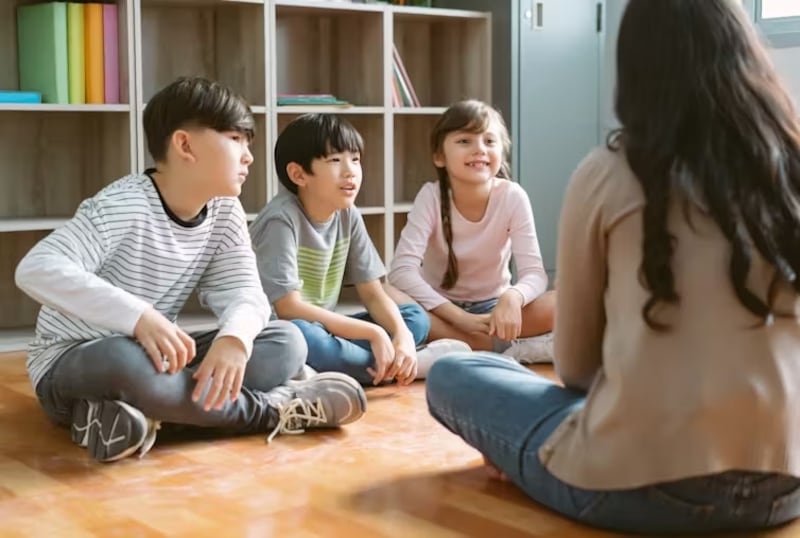Recent data shows that around 20% of children and young people aged from eight to 25 years have a probable mental disorder.
This is an increase from the 10% recorded in 2017, when the UK government declared the prevalence of mental ill health in children and young people to be “one of the burning injustices of our time”.
Lack of investment in mental health services, coupled with growing demand, has left many children and young people with limited or no support.
The effects are being felt in schools. Ofsted’s 2023 annual report includes concern about the rising use of part-time timetables in schools – which can be for children struggling with their mental health. Part-time attendance may involve only attending school on specified days or daily attendance but with a reduction in the number of hours pupils spend in school.
Schools are operating with already stretched resources. But they are an obvious route to supporting children’s mental health. Children and young people spend a significant proportion of their time in schools.
With the proper resources to help, schools could offer swift support – especially when many children and young people experience delays in accessing external support, particularly from child and adolescent mental health services.
A key way that schools could support children’s mental health is the introduction of a mental health curriculum. This would aim to develop pupils’ mental health literacy by developing their knowledge of mental health issues and introducing them to strategies to manage their own mental health.
Dedication to mental health
My own research with colleagues explored the impact of a mental health curriculum delivered by a sports community trust and school partnership, with 570 young people in schools across Cambridge.
The curriculum included sessions on stress, resilience, social media use and self-management strategies. A mental health curriculum was designed and delivered by sports coaches who were employed by the community trust and trained in mental health to students in secondary schools. Footballers from the local football club contributed by sharing their own lived experiences of mental ill-health.
Not only did students’ knowledge of mental health improve, but they also gained knowledge of strategies to help themselves cope with adversity and how to help others with mental ill health.
Another strand of the whole school approach relates to working in partnership with children and young people to improve mental health. We conducted another study in which older students acted as mentors in secondary schools. They designed and delivered weekly physical activity sessions to younger students with social, emotional and mental health needs.
We found that this improved levels of physical activity, which supported children’s mental health. The younger students gained coping skills and the programme also helped with their social skills, by leading to the development of supportive and trusting relationships between mentors and the students they were supporting.
Both studies illustrate that schools can play a role in supporting children and young people’s mental health – but that they require help and funding to do so.
Space and time
Nurture groups are used in some schools to support children with social, emotional and mental health needs. They can take place in nurture rooms, which tend to be more informal spaces than standard classrooms and provide positive environments for children to develop social and emotional literacy and regulation skills.

Nurture groups focus on helping children with their confidence, self-esteem and communication and with establishing positive relationships with others. These skills are explicitly taught and children have opportunities to practise the skills they learn.
A research study involving 384 children aged five and six demonstrated improvements in social, emotional and behavioural outcomes, although there was no evidence that nurture groups led to improvements in academic outcomes.
Mindfulness is another practice that can take place in schools. The aim of mindfulness, as a practice, is to focus attention on the present rather than the past or the future, through guided participation. This could include focusing on breathing or a specific part of the body.
People can then use mindfulness by themselves to support their own mental health. Research with 216 secondary school students has demonstrated positive effects, including improvements in emotional regulation and emotional clarity as well as a reduction in perceived stress.
However, it is important to remember that teachers are not mental health therapists. There are professional boundaries that apply to what they can and cannot do. In a 2023 documentary on young people and mental health, presenter Roman Kemp called for the government to commit funding so that all schools can benefit from the expertise of an education mental health practitioner.
These practitioners are employed by the NHS. They are deployed into schools to provide help for children and young people with mental health needs. Increasing investment in this service would ensure that schools are better resourced and able to address mental health needs.
In addition, increased government funding would also enable all schools to appoint a suitably qualified designated member of staff to lead and manage the mental health provision across the school. This should be a protected role, free from other responsibilities.
Proper investment in mental health services is urgently required so that young people can get the support that they need in a timely manner.
Jonathan Glazzard, Rosalind Hollis Professor of Education for Social Justice, University of Hull
This article is republished from The Conversation under a Creative Commons license. Read the original article.


